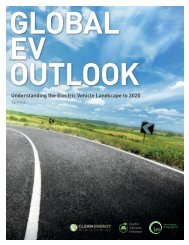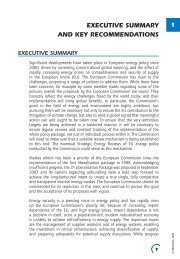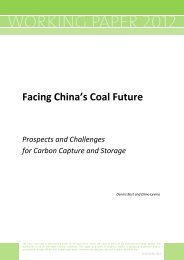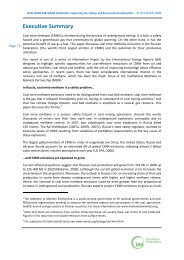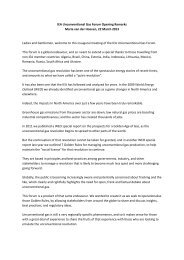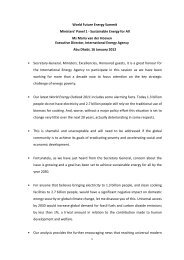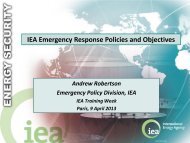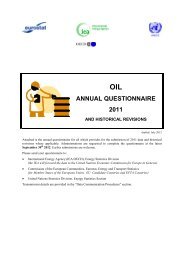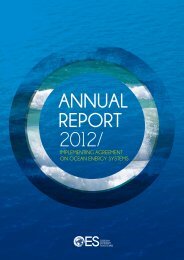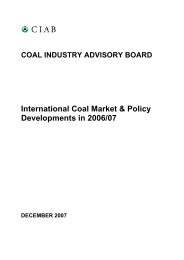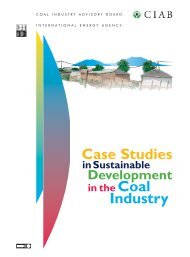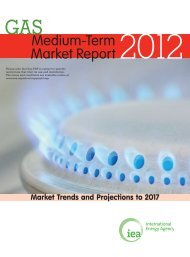Good morning ladies and gentlemen, It is my pleasure to speak ... - IEA
Good morning ladies and gentlemen, It is my pleasure to speak ... - IEA
Good morning ladies and gentlemen, It is my pleasure to speak ... - IEA
Create successful ePaper yourself
Turn your PDF publications into a flip-book with our unique Google optimized e-Paper software.
<strong>Good</strong> <strong>morning</strong> <strong>ladies</strong> <strong>and</strong> <strong>gentlemen</strong>,<br />
<strong>It</strong> <strong>is</strong> <strong>my</strong> <strong>pleasure</strong> <strong>to</strong> <strong>speak</strong> <strong>to</strong> you <strong>to</strong>day here in Rotterdam, at th<strong>is</strong> important conference for the<br />
biofuel sec<strong>to</strong>r.<br />
At the <strong>IEA</strong> we track <strong>and</strong> evaluate all aspects of the global energy econo<strong>my</strong> which can have an impact<br />
on energy security. And we look closely through our scenario analys<strong>is</strong> <strong>and</strong> other work at the<br />
technologies needed <strong>to</strong> provide energy securely in<strong>to</strong> the future. We carefully analyse the<br />
contribution that biofuels make <strong>to</strong> world liquid fuel supplies in the current market – for example<br />
within our Medium Term Oil Market Report. We also look <strong>to</strong> the long-term future of the energy<br />
sec<strong>to</strong>r <strong>and</strong> one of our series of technology roadmaps focuses on Biofuels for Transport.<br />
So in <strong>my</strong> talk <strong>to</strong>day I would like <strong>to</strong> focus on four main <strong>is</strong>sues:<br />
1. Why do we think biofuels are important now <strong>and</strong> in<strong>to</strong> the future?<br />
2. How <strong>is</strong> the current market evolving?<br />
3. What do we see as the major challenges for the sec<strong>to</strong>r?<br />
4. How can these challenges be best addressed?<br />
So why do we think biofuels are important?<br />
Our long-term energy scenario analys<strong>is</strong> within our Energy Technology Perspectives publication shows<br />
that we are currently on a very unsustainable track in terms of global energy-related CO 2 em<strong>is</strong>sions.<br />
In a business-as-usual scenario, we would see em<strong>is</strong>sions r<strong>is</strong>e <strong>to</strong> 58 billion <strong>to</strong>nnes by 2050 – almost<br />
twice the current level.<br />
The transport sec<strong>to</strong>r has also been growing rapidly, along with the associated CO 2 em<strong>is</strong>sions. As you<br />
can see in the figure we expect th<strong>is</strong> trend <strong>to</strong> continue <strong>and</strong> transport-realted CO 2 em<strong>is</strong>sions could<br />
account for one-fourth of all energy-related em<strong>is</strong>sions in 2050 under our business-as-usual Baseline<br />
Scenario. So it <strong>is</strong> obvious that we need <strong>to</strong> change the current trajec<strong>to</strong>ry. But the challenge <strong>is</strong> that the<br />
transport sec<strong>to</strong>r <strong>is</strong> one of the most difficult <strong>to</strong> decarbon<strong>is</strong>e.<br />
In our ambitious low-carbon scenario, we see that some 9 billion <strong>to</strong>nnes of CO 2 equivalent could be<br />
avoided by 2050 compared with the baseline em<strong>is</strong>sions trajec<strong>to</strong>ry. Much of these savings can be<br />
achieved with improvements <strong>to</strong> vehicle energy efficiency <strong>and</strong> fuel switching. However there will be<br />
some transport sec<strong>to</strong>rs in which it <strong>is</strong> difficult <strong>to</strong> find low-carbon fuel alternatives. Th<strong>is</strong> <strong>is</strong> in particular<br />
the case for long-haul transport by air, sea <strong>and</strong> road, where liquid fuels will remain dominant for the<br />
time being. Th<strong>is</strong> <strong>is</strong> where we see the important role for sustainable biofuels, which could potentially<br />
provide up <strong>to</strong> 27% of road-transport fuel by 2050 with associated savings of 2.1 billion <strong>to</strong>nnes of CO 2 .<br />
Our Technology Roadmap on Biofuels for Transport shows how th<strong>is</strong> transition might be achieved.<br />
You can see – highlighted in purple – that the dem<strong>and</strong> for biofuels used in long-haul transport like<br />
bio-kerosene <strong>and</strong> other advanced biodiesel fuels <strong>is</strong> growing strongly over time.<br />
In order <strong>to</strong> achieve the required em<strong>is</strong>sions reduction in the transport sec<strong>to</strong>r there needs <strong>to</strong> be a<br />
gradual shift <strong>to</strong>wards new technologies based on feeds<strong>to</strong>cks <strong>and</strong> processes that are the most<br />
efficient in terms of em<strong>is</strong>sion reductions <strong>and</strong> l<strong>and</strong>-use. Th<strong>is</strong> includes enzymatic conversion of
iomass <strong>to</strong> ethanol <strong>and</strong> butanol, thermo-chemical processes which can convert cellulosic feeds<strong>to</strong>cks<br />
in<strong>to</strong> high-value synthetic biofuels, as well as novel routes based on algae <strong>and</strong> bacteria.<br />
But 2050 <strong>is</strong> a long time horizon, <strong>and</strong> it <strong>is</strong> important <strong>to</strong> look at the current developments <strong>to</strong> highlight<br />
what challenges need <strong>to</strong> be overcome in the short term <strong>to</strong> pave the way <strong>to</strong>wards a long-term change<br />
in trajec<strong>to</strong>ry. So what <strong>is</strong> happening in the sec<strong>to</strong>r at present?<br />
The sec<strong>to</strong>r has been exp<strong>and</strong>ing rapidly over the last decade. The growth has been strongest in Brazil,<br />
the United States <strong>and</strong> in the European Union, but over 50 countries now have adopted policies<br />
designed <strong>to</strong> promote biofuels use. The policies have been put in place for three main reasons –<br />
energy security, em<strong>is</strong>sions reductions <strong>and</strong> rural economic development. The latter has been an<br />
important motivation for biofuel policies in the United States, as well as in Europe <strong>and</strong> <strong>is</strong> also a very<br />
important driver for biofuel development in many developing countries.<br />
In 2012 global biofuel production was about 1.9 million barrels per day, or 110 billion litres per year.<br />
Biofuels accounted for 3% of world road transport fuels, <strong>and</strong> met 1.5% of world oil supply on an<br />
energy adjusted bas<strong>is</strong>.<br />
Th<strong>is</strong> may not sound like a large contribution, but it <strong>is</strong> actually equivalent <strong>to</strong> UK crude oil production<br />
(1.2 mb/d of world crude production). And so biofuels already make an important contribution at<br />
the margin <strong>to</strong> world oil markets.<br />
But the impressive growth of the sec<strong>to</strong>r over the last decade has stalled in the last two years. Th<strong>is</strong><br />
shows that the industry <strong>is</strong> facing challenges, <strong>and</strong> many of you here will have experienced th<strong>is</strong> in<br />
everyday business.<br />
So what are these challenges?<br />
The ethanol sec<strong>to</strong>r in Brazil, which has long time been a rapidly growing sec<strong>to</strong>r, has been facing<br />
some challenges in the last two years. High sugar prices made ethanol production unprofitable, <strong>and</strong><br />
let many producers favour sugar over ethanol production. Financial difficulties in the sec<strong>to</strong>r had an<br />
impact on establ<strong>is</strong>hment of new sugarcane fields <strong>and</strong> replanting of aging cane, <strong>and</strong> yields went<br />
down. But the situation <strong>is</strong> improving now, <strong>and</strong> we expect production levels <strong>to</strong> increase in the coming<br />
year.<br />
There <strong>is</strong> one specific aspect in the Brazilian market, however, that made it particularly difficult for<br />
ethanol <strong>to</strong> compete with gasoline. <strong>It</strong> <strong>is</strong> the fact that the government regulates the gasoline price <strong>to</strong><br />
control inflation. You can see in the figure that despite rather volatile oil prices in the last years, the<br />
gasoline retail price in Brazil has been almost unchanged. So when biofuels are critic<strong>is</strong>ed for being<br />
<strong>to</strong>o expensive <strong>and</strong> economically not viable, it <strong>is</strong> important <strong>to</strong> take a closer look at the situation <strong>and</strong><br />
assess if there <strong>is</strong> a level playing field.<br />
But the situation in Brazil <strong>is</strong> not the only reason why global biofuel production has stalled recently. In<br />
the United States we saw that a severe drought last summer reduced the corn crop <strong>and</strong> led <strong>to</strong> a<br />
significant increase in corn prices. As you can see in the figure, th<strong>is</strong> r<strong>is</strong>e in corn prices coincides with<br />
a drop in ethanol production. The reason <strong>is</strong> that many producers were struggling <strong>to</strong> maintain<br />
positive profit margins, <strong>and</strong> therefore decided <strong>to</strong> reduce production or temporary idle plants.
In a similar way, producers in the European Union have been struggling with high vegetable oil <strong>and</strong><br />
grain prices, <strong>and</strong> have often been operating on very small or even negative margins.<br />
Th<strong>is</strong> shows that further improvement <strong>is</strong> needed <strong>to</strong> make conversion processes more efficient, <strong>and</strong><br />
improve the link between feeds<strong>to</strong>ck prices <strong>and</strong> economics of production.<br />
But economics of production are not the only challenge the sec<strong>to</strong>r needs <strong>to</strong> deal with. The overall<br />
sustainability of biofuels – which covers many environmental, social <strong>and</strong> economic <strong>is</strong>sues – also<br />
remains a controversial <strong>to</strong>pic.<br />
For example the world faces increasing water shortages. The World Energy Outlook of 2012<br />
highlighted that water scarcity will increasingly determine our energy management <strong>and</strong> that some<br />
biofuel production <strong>is</strong> still <strong>to</strong>o water-intensive, <strong>and</strong> a move <strong>to</strong>wards crops which do not need<br />
irrigation will be essential.<br />
Another key <strong>is</strong>sue for policy makers <strong>is</strong> that of l<strong>and</strong>-use competition – with new impetus <strong>to</strong> the “food<br />
versus fuel” d<strong>is</strong>cussion after the high corn prices in the United States, <strong>and</strong> many people have<br />
questioned the role of biofuels on agricultural commodity prices. In fact an analys<strong>is</strong> shows that there<br />
are many fac<strong>to</strong>rs other than biofuels production which influence food prices – weather patterns are<br />
one clear such fac<strong>to</strong>r. One of the strongest correlations <strong>is</strong> between energy prices <strong>and</strong> food prices.<br />
But in times of tight supply producing biofuels may play a role, <strong>to</strong>o.<br />
Now all these <strong>is</strong>sues are leading policy makers be cautious about continuing support for biofuels.<br />
While the science <strong>and</strong> analys<strong>is</strong> of many <strong>is</strong>sues <strong>is</strong> continuing, we see that biofuel policies are coming<br />
more <strong>and</strong> more under review. The most recent example <strong>is</strong> the draft proposal of the European<br />
Comm<strong>is</strong>sion <strong>to</strong> limit the share of conventional biofuels <strong>to</strong> 5% of <strong>to</strong>tal transport fuel by 2020. Even<br />
though th<strong>is</strong> <strong>is</strong> just a proposal, it shows that the requirements for the biofuel sec<strong>to</strong>r are changing.<br />
How can these impacts be mitigated or avoided?<br />
Moving <strong>to</strong> using wastes <strong>and</strong> residues produced in synergy with food crops <strong>is</strong> clearly one way.<br />
Another way <strong>is</strong> <strong>to</strong> provide biofuel feeds<strong>to</strong>ck by increasing productivity – so producing more from the<br />
same amount of l<strong>and</strong>. One interesting approach being successfully adopted Brazil <strong>is</strong> <strong>to</strong> constrain<br />
areas where sugarcane can be grown. By increasing the intensity of cattle production, l<strong>and</strong> can be<br />
made available for additional sugarcane planting, so overall productivity increases without<br />
decreasing food production. There <strong>is</strong> much scope for such improved l<strong>and</strong>-management practices.<br />
So what <strong>is</strong> the way forward? We suggest there are two main priorities.<br />
The first <strong>is</strong> the need for clear <strong>and</strong> internationally agreed sustainability indica<strong>to</strong>rs <strong>and</strong> certification<br />
schemes for biofuels. <strong>Good</strong> progress <strong>is</strong> being made on th<strong>is</strong> front. The <strong>IEA</strong> has been an active<br />
member of the Global Bioenergy Partnership (GBEP), for instance. And we are happy <strong>to</strong> see that the<br />
indica<strong>to</strong>rs developed by the GBEP are currently being tested in a number of case studies in both<br />
producing <strong>and</strong> consuming countries.<br />
The certification required for instance under the EU Renewable Energy Directive <strong>is</strong> also a positive<br />
step forward <strong>to</strong> establ<strong>is</strong>h a market for sustainable biofuels. The next step <strong>is</strong> now <strong>to</strong> ensure that the
certification schemes are aligned internationally, so they do not act as trade barriers, <strong>and</strong> then policy<br />
makers <strong>and</strong> industry should know where they st<strong>and</strong>.<br />
The second key step forward needs <strong>to</strong> be the transition <strong>to</strong> the most efficient processes in terms of<br />
carbon savings. Focussing production on wastes <strong>and</strong> residues, ensuring production <strong>is</strong> as efficient as<br />
possible <strong>and</strong> deploying the advanced biofuels technologies are highlighted in the <strong>IEA</strong>’s Biofuel<br />
Roadmap.<br />
The good news <strong>is</strong> that we see that the demonstration <strong>and</strong> first commercial-scale advanced biofuel<br />
plants are now coming online, particularly in the United States <strong>and</strong> in Europe but in China <strong>to</strong>o.<br />
And you can see in the figure that a number of projects are currently under construction <strong>and</strong> an<br />
even bigger number are planned.<br />
The bad news <strong>is</strong> that progress in deploying these technologies has been at a much slower pace than<br />
many had anticipated <strong>and</strong> than what would be needed <strong>to</strong> keep on track with our roadmap<br />
aspirations. Many potential producers have found it difficult <strong>to</strong> secure the capital that they need in<br />
order <strong>to</strong> invest in commercial plants. But these large-scale plants are needed <strong>to</strong> demonstrate largescale<br />
production <strong>and</strong> <strong>to</strong> reach an econo<strong>my</strong> of scale that will lead <strong>to</strong> cost reductions.<br />
Governments have been actively helping th<strong>is</strong> process through support for R&D <strong>and</strong> with help at the<br />
demonstration stage – for example the United States has provided support in the form of loan<br />
guarantees. However the current policy mechan<strong>is</strong>ms have not yet successfully mitigated the<br />
investment r<strong>is</strong>ks related <strong>to</strong> these first-of-their-kind production units. Continued support for R&D,<br />
<strong>and</strong> possibly some additional support measures, will therefore be needed <strong>to</strong> get through the “valley<br />
of death” in order <strong>to</strong> help the technologies <strong>to</strong> enter commercial production. If th<strong>is</strong> does not happen,<br />
it will be very difficult <strong>to</strong> reach the penetration level that we think <strong>is</strong> needed <strong>to</strong> move <strong>to</strong>wards a lowcarbon<br />
energy sec<strong>to</strong>r.<br />
So let me conclude the presentation by summar<strong>is</strong>ing the key messages of <strong>my</strong> talk:<br />
Biofuels have an important role <strong>to</strong> play as an essential part of a decarbon<strong>is</strong>ed transport sec<strong>to</strong>r in<br />
the future.<br />
Biofuels are already an important part of our energy mix <strong>to</strong>day, <strong>and</strong> continue <strong>to</strong> make an increasing<br />
contribution <strong>to</strong> the world’s transport fuel supply.<br />
Th<strong>is</strong> growth can not be taken for granted, however.<br />
In order <strong>to</strong> ensure the long-term future of the sec<strong>to</strong>r, sustainability needs <strong>to</strong> be pre-requ<strong>is</strong>ite for<br />
production.<br />
The sustainability challenges the biofuel sec<strong>to</strong>r <strong>is</strong> facing can be tackled through the adoption of<br />
internationally agreed sustainability schemes.<br />
And, finally, advanced biofuels have a key role <strong>to</strong> play in decarbon<strong>is</strong>ing the transport sec<strong>to</strong>r. But<br />
continued <strong>and</strong> stronger support measures by governments will be needed <strong>to</strong> enable investments in<br />
these technologies.



